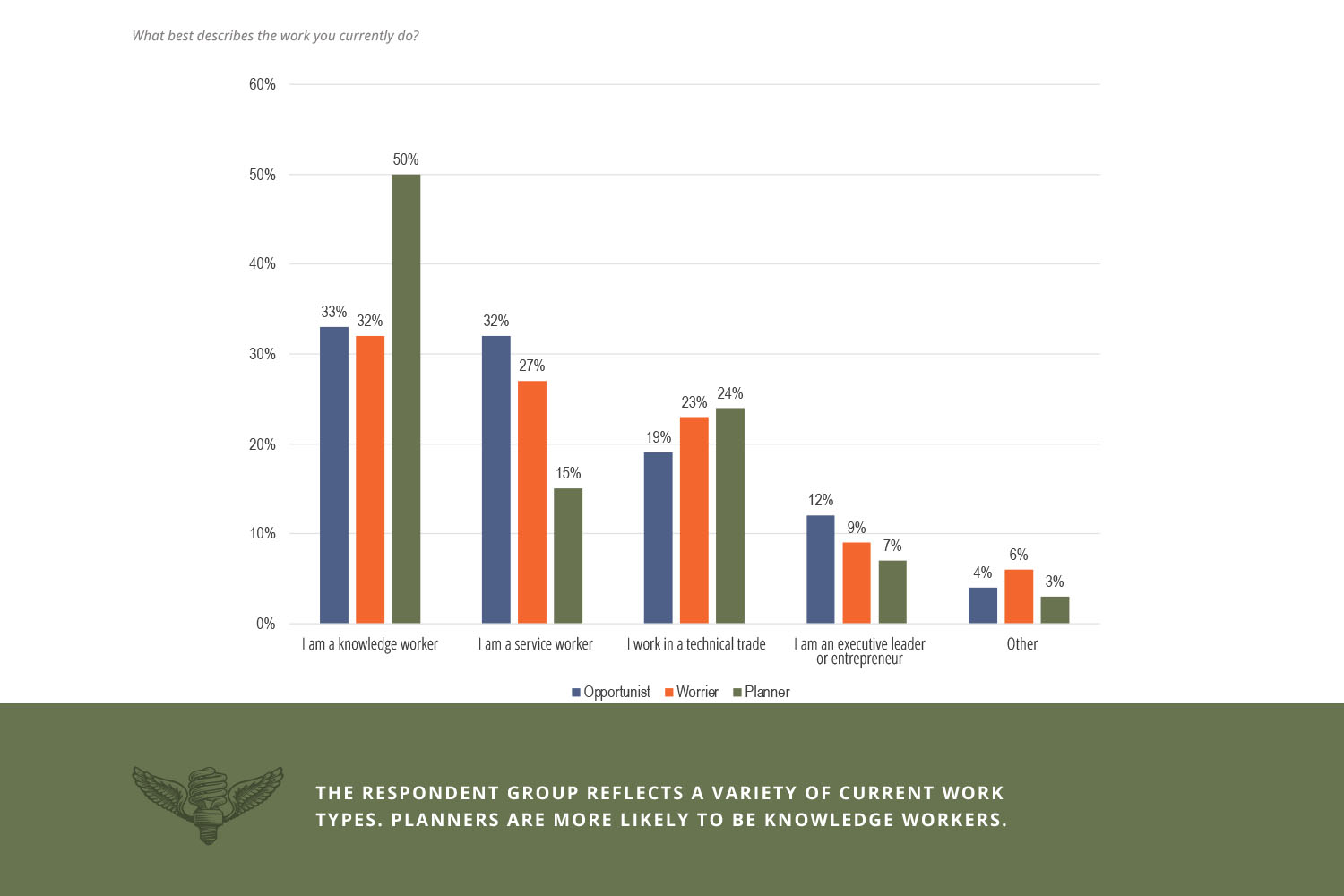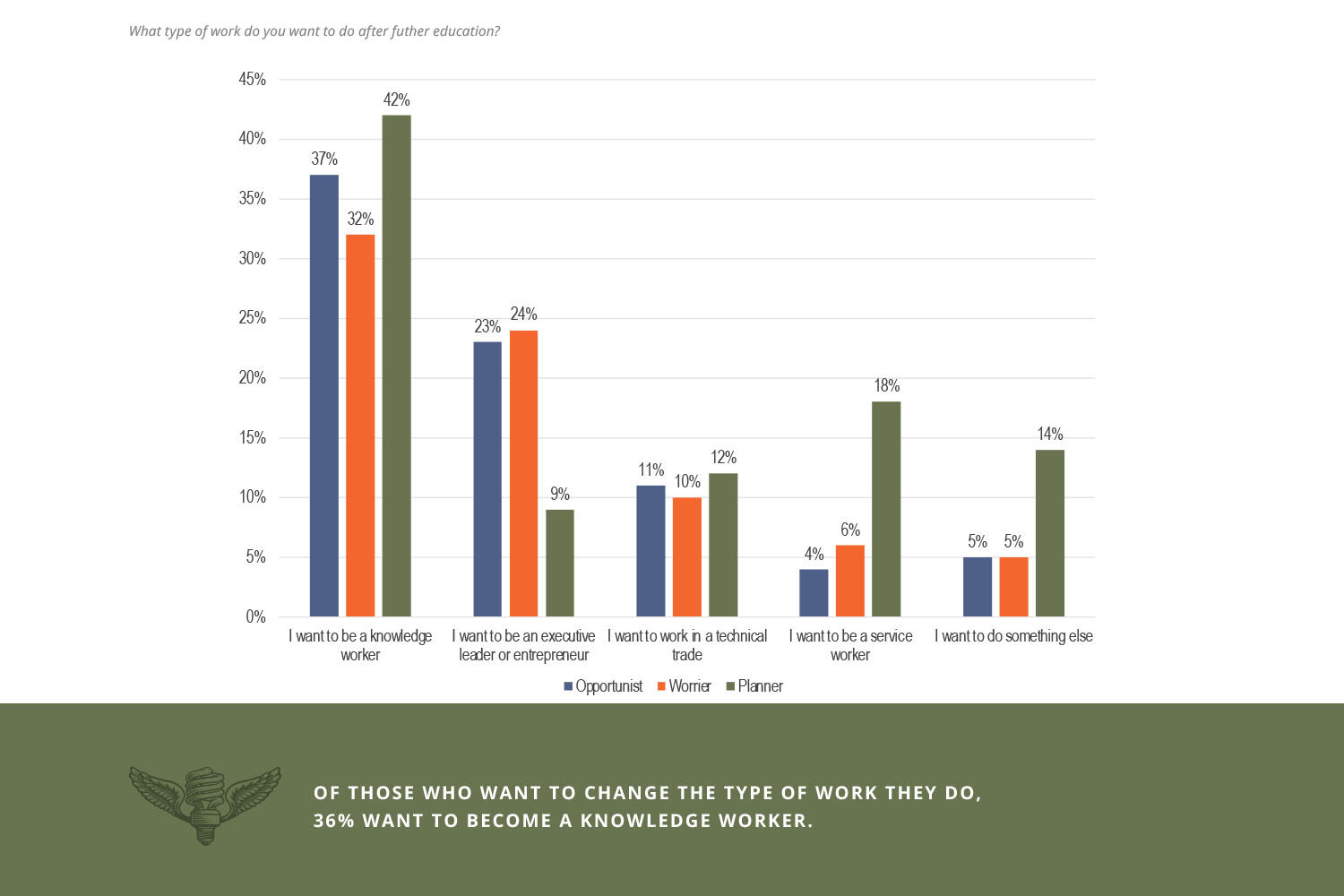Need fresh thinking? Help is a few keystrokes away.
Knowledge Work is the Future for Students Who Want to Change Their Careers
Aptitudes for specific types of work contribute to attitudes about what makes work meaningful and interesting.
Someone who excels in math, for example, might gravitate toward a career field where they can put their knowledge to work. Others with a knack for customer service, creating things with their hands, or performing technical tasks will be more likely to seek work in line with their interests.
It makes sense that identifying these skillsets and worker categories within groups of adults who share common beliefs would help marketers zero in with the perfect recruitment pitch—customized for a highly targeted type of potential student.
Thanks to attitudinal segment research which includes three major worker classifications, education industry marketers can do just that.
LAVIDGE conducted a national adult education research study post-pandemic. The objective was to learn attitudes of adult learners and define segments that share those attitudes.
The study uncovered three key adult education consumer segments:
- Opportunist - positive about the value of investing in education and the possibilities for trained workers. Believe college isn’t necessarily for everyone.
- Worrier - aren’t sure where their career is going, concerned about the cost of education, believe their skills are out-of-date and feel like they chose the wrong career path.
- Planner - see value in education, have a career plan and feel responsible for supporting others financially.
This is the sixth in a series of articles in which we reveal several “Light-Bulb Moments” our post-pandemic research uncovered about adult learners.
Light-Bulb Moment 6: Knowledge work is the future for students who want to change their career
Not all career journeys are alike. Neither are the educational pathways which lead workers to their career or occupation of choice.
For the purposes of our study, we identified three categories of worker types: Knowledge Workers, Service Workers and Technical Trade Workers:
- Knowledge Workers seek careers in fields such as Information Technology, Accounting, Programming, Engineering, or as a Medical Technician and others which require specific education to prepare them for success.
- Service Workers work in Restaurants, Retail, Hotels, Hospitality and other related industries.
- Technical and Trade Workers learn in-demand skills such as Welding, Construction, Plumbing, Mechanics, HVAC, Manufacturing, Machining and other hands-on specialties.
Our proprietary research uncovered the percentages within each attitudinal segment that desire work within one of these three pre-determined categories, as well as those who would prefer an executive position or entrepreneurship.
Respondents reflect a variety of current lines of work
A diverse pool of respondents participated in our research about the impact of the pandemic on what adults believe about education reflecting Knowledge, Service and Technical Trades workers.
Additionally, each worker category included representation from all three attitudinal segments identified: Opportunists, Worriers and Planners.
One segment, however, stood out from the rest. Half of all Planners (50%) indicated they were currently Knowledge Workers, the most-sought-after category for every attitudinal segment. Opportunists (33%) were nearly 20 percentage points less likely to already be in a knowledge-based field, with Worriers (32%) a single percentage point behind.
Study respondents were next-most likely to be Service Workers representing 32% of Opportunists, 27% of Worriers and 15% of Planners.
Planners account for 24% of workers in a technical trade, with slightly fewer each of Worriers (23%) and Opportunists (19%).
Of those who responded, a handful (13%) overall chose “other” to identify their current field of work. Meanwhile, 28% of respondents overall identified as an executive leader or entrepreneur, including 12% of Opportunists, 9% of Worriers and 7% of Planners.

Workers who walk want something better
The Great Resignation, largely inspired by new perspectives American workers gained during the pandemic, reflects an increase in adult workers walking away from their jobs—at a rate of about 4 million per month.
The U.S. Department of Labor’s Job Openings and Labor Turnover Summary (JOLTS) released in July 2022 confirms that as of May 2022, “the number and rate of quits were little changed at 4.3 million and 2.8 percent, respectively.” By comparison, this is higher than 1.99%, which is the long-term average for people who voluntarily leave their jobs.
“Over the 12 months ending in May, hires totaled 78.4 million and separations totaled 72.0 million, yielding a net employment gain of 6.4 million,” the report states. “These totals include workers who may have been hired and separated more than once during the year.”
The JOLTS quits rate is a reliable way to measure how willing and able workers are to walk away from their current employer.
The July 2022 JOLTS report also reveals that willingness to make a career change varies by region, with workers in the South most likely to quit. The region’s 3.0% quits rate recorded in May 2021 had risen to 3.2% by May 2022. Meanwhile, the quits rate in the West went from 2.6% to 2.8% during the same period, and the quits rate in the Northeast rose from 1.8% to 2.1%.
The only region in which the quits rate dipped slightly year over year was the Midwest, where JOLTS recorded 2.8% in May 2021 and 2.7% in May 2022.
Because Knowledge Work requires higher education or specific training, pay tends to outpace that of other categories. This is a trend that has intensified over time.
Educational Attainment in the United States: 2021, a report published Feb. 24, 2022, by The U.S. Census Bureau, reveals the disparity between the mean earnings of workers 18 or older based on their level of education.
In 2020, the mean annual income for workers 18 and older among all sexes and racial backgrounds was $58,329. The mean annual income for those who had not graduated from high school that year was significantly less at $23,545. For those who completed 12th grade, the mean annual income increased to $39,498, while having some college or an associate degree raised the median annual income to $44,176.
The greatest monetary reward tied to one’s level of education comes into play for those with a bachelor’s degree or an advanced degree, with mean annual incomes of $73,499 and $104,833 respectively.
Clearly, the disparity in pay between adult workers with the lowest and highest levels of education has increased significantly. Being educated as a Knowledge Worker, then, is more valuable than it’s ever been and has the capacity to greatly improve one’s standard of living.
Planners (42%) were most likely to show interest in becoming a Knowledge Worker, along with 37% of Opportunists and 32% of Worriers.
Becoming an executive leader or an entrepreneur was next on the priority list among respondents within all attitudinal segments, with Worriers ranking highest at 24% and Opportunists next-most likely at 23%. Planners, at 9%, were not nearly as interested in making a change to become either.

Opportunists and Worriers desire executive and entrepreneurial roles
Opportunists (23%) and Worriers (24%) expressed interest in pathways to becoming an executive or an entrepreneur. Planners who, at 9%, are most likely to already have such a role are least likely to desire such a change.
The U.S. Bureau of Labor Statistics Occupational Handbook, last updated April 18, 2022, reveals a median pay in 2021 among top executives of $98,980 per year or $47.59 per hour. A bachelor’s degree and significant work experience of at least five years is generally required to make the leap. The value of completing a bachelor’s degree can be substantial for those who already have the required experience in their field.
Meanwhile, the COVID-19 pandemic proved to be a major motivator for those with an entrepreneurial spirit to take the leap. The rise of work-from-home options which grew exponentially during government shutdowns lowered the cost of doing business, making entrepreneurship more accessible. The trend of accelerated growth in small business ownership is expected to continue into 2023 and beyond as workers walk away from careers to create something of their own.
Although an entrepreneur isn’t at the behest of a hiring manager to hold a specific certificate or degree, there are some educational tracks which help pave the way toward success such as a Master of Business Administration from a traditional university or a variety of non-credit or professional certificate programs offered to build entrepreneurial skills.
Opportunists, far and away, are most interested in Service Work
Eighteen percent of respondents identified as Opportunists by our study indicated a desire to become a Service Worker. No formal education or credential is needed for many positions within service-providing industries such as a food and beverage server, bartender, cashier, food preparation, or retail. Some, such as flight attendants and customer service representatives, are required to have a high school diploma or equivalent. Others, such as EMTs and paramedics, need additional training specific to their field.
Opportunists, Worriers, and Planners showed about the same level of interest at 11%, 10%, and 12% respectively in changing careers to work in a technical trade.
While interest in this field was smaller than the other three categories, between 10% and 12% is still significant when it comes to a pool of potential students in need of career training.
Partner with an experienced education industry marketing agency for adults
Reaching adult learners who hold each of these beliefs—and targeting them one at a time for the best effect—requires attitudinal research. Going it alone, especially in a post-pandemic market, can be risky for educational institutions. More than ever, it’s important to choose the best agency to partner with for consumer education marketing messages for adult learners.
Consumer attitudes are changing, and you need an experienced team with significant industry experience combined with access to developing consumer insight based on what your audience of learners believe.
You’ll find just that with LAVIDGE.
In fact, education marketing is a core category at LAVIDGE. We invest in primary research to keep abreast of consumer shifts in the education industry, launching our first education study in 2018.
Finally, because our strong roster of current and past clients represents a wide range of organizations in the education category including International Sports Sciences Association (ISSA), CampusLogic, Rio Salado College, Arizona State University, and Arizona Department of Education, it’s clear that LAVIDGE is an agency you can trust.
We’d love to bring you into the fold.
To learn more about our Adult Education attitudinal research study, contact Dave Nobs.


